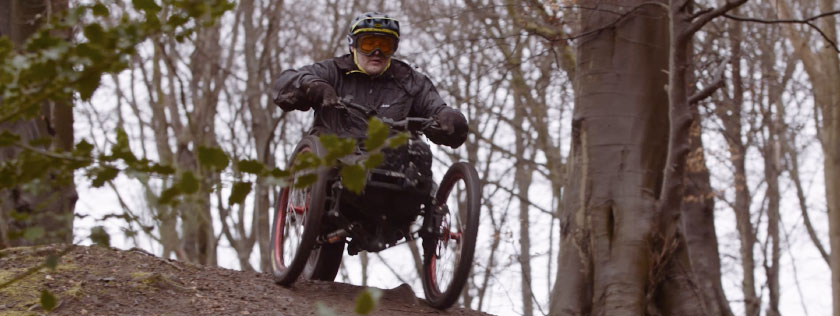Adventure sports enthusiast can still bike and travel the world thanks to £3.1million accident at work claim

At his heart, Robin Williamson is an adventurer
An outdoorsman. An extreme sports fan. A keen traveller.
Mountain biking. Paragliding and literally throwing himself from clifftops and flying over the highest peaks. Travelling the world in his motorhome.
And do you know what…
Being confined to a wheelchair after an accident at work changed none of that.
That’s why Robin wants everyone to know that while a spinal cord injury can impact your mobility, it doesn’t have to impact your passions.
Robin tells his story
Robin’s story
It was 5 April 2018 when Robin’s life changed.
Working as an asbestos surveyor he was doing a job at Netherton Community Centre in Glasgow when he suffered a serious accident.
Robin, 45, fell backwards through a skylight.
He fell nearly nine metres – the equivalent height of two double-decker buses – before being found motionless on the floor by a colleague.
Robin from Bridge of Allan near Stirling, said: "Of the actual fall I remember nothing at all.
"Next thing I know is becoming aware I had tubes coming out of my body and not liking it."
Robin was taken to Queen Elizabeth University Hospital and treated for multiple skull fractures and a serious head injury with bleeds to the brain. He had post-traumatic amnesia for around six weeks.
But it was the damage to his spinal cord that resulted in the most impactful change to his life.
"Unstable fracture of the 5th cervical vertebrae."
"Unstable fracture dislocations of the 11th and 12th thoracic vertebrae and the 3rd and 4th lumbar vertebrae."
"Complete paralysis from the thoracic 12 level down."
Such medical terms meant nothing to Robin, as it would many people. But one phrase jumped out – "complete paralysis".
The T-12 fracture meant Robin was left paralysed from the waist down.
Robin said: “When I learned I’d never walk again I was still so confused from the head injury and drugs I didn’t appreciate the horror of it.
"I just kept thinking I'd never again be able to do the things that gave me purpose in life and defined me as a person.
"My wife was overwhelmed but overjoyed I’d survived the brain trauma though she still didn’t know if I would ever be able to come home and live independently."
Robin spent 15 days in neurosurgical intensive care and five and a half weeks in a neurological ward before being moved to the Queen Elizabeth National Spinal Injuries Unit – a faction of the hospital dedicated to providing in-depth, hands-on care and support tailored to the needs of each survivor.
In the unit he slowly continued to recover until he could communicate, understand his injuries and eat solid food again.
Staff there helped Robin learn the vital skills he would need as a full time wheelchair user when he was discharged to the real world and rebuild the strength in his body he would need.
This meant that when he returned home he could move around, manage his bowels and bladder and wash and dress himself while knowing what signs to look out for to avoid pressure injury to his skin.
Robin explained: "My sister is a solicitor in England and she knew of Digby Brown’s reputation. Because I was so unwell after the accident, my sister and wife contacted Digby Brown on my behalf."
Moira Kay, Partner in our Serious Injury Department, led the legal investigation.
She gathered medical evidence, witness statements, expert reports and was able to build a strong civil case.
Moira also very quickly engaged with the insurance company of Robin’s employers to ensure that his rehabilitation continued once discharged home and he had access to interim payments to ensure he had financial stability and allow him to make his home suitable for his needs.
Within two years of the date of the accident, the insurance company settled the case – for the fair and reasonable sum of £3.1million.
It might seem like a lot but every penny of the compensation can be accounted for as it’s part of what a personal injury solicitor has to do – they have to gather all the evidence to show why this amount is needed and why it is fair, and in Robin’s case this included:
- Pain and suffering
- Lost earnings (past and future) and impact to his pension
- Care costs
- Home adaptation costs
- Service costs (to hire help for cleaning, gardening, etc)
Complex injuries don’t necessarily result in complex legal cases. While it can be challenging to gather all the different aspects of evidence, at Digby Brown we have more than 40 years experience in helping people affected by serious injuries, so we know how to overcome any hurdles.
And as Robin experienced, it meant his claim was handled in a very straightforward way and without the need to go to court.
Moira said: "I first met Robin when he was receiving rehabilitation in the National Spinal Injuries Unit. My abiding memory of him is how talkative he was!
"While he was in good spirits both he and his wife, Susan, were very anxious about what the future would hold for them.
"However I was able to reassure them both that we would be able to establish that his employers had been at fault.
"People like Robin should have been protected from the beginning so they were never injured but it does mean that as solicitors, we know we are doing the right thing to help them get the damages, recognition, treatment and future they deserve."
It was reported in December 2022 that Robin’s employers were held criminally accountable for his injuries – they were fined £200,000 after pleading guilty to health and safety failings.